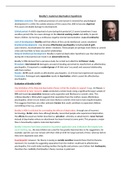Bowlby’s maternal deprivation hypothesis
Definition overview: The continual presence of care/nurture is essential for psychological
development in a child, the sudden absence of this causes the child to become deprived.
This causes inevitable damage to development.
Critical period: If child is deprived of care during this period of 2.5 years (sometimes 5-year
sensitive period) this can cause damage to the internal working model and ability to parent
future children, by forming a continuous negative mental representation. (Law of continuity)
Lack of development: Bowlby said that effects of this can be intellectual, social, emotional.
Emotional development: may develop Affectionless psychopathy including lack of guilt,
Lack remorse, inconsideration for others’ emotions. These people are perhaps more likely to commit
crime and less likely to have successful relationships.
Delayed intellectual development: Bowlby’s maternal deprivation hypothesis says that deprivation
during the critical period can result in an abnormally low IQ.
Bowlby’s MDH derived from a previous study he carried out called the 44 thieves’ study.
Procedure: Interviewed 44 teenagers accused of stealing and aimed to classify them as affectionless
psychopaths. (Compared to a control group of 44 that aren’t accused) and assessed relationship
with their mother.
Results: 14/44 could classify as affectionless psychopaths, 12 of those had experienced separation.
Conclusion: Prolonged early separation results in deprivation, which caused the affectionless
psychopathy.
Evaluation of Bowlby’s MDH
One limitation of the Maternal deprivation theory is that the studies to support it e.g., 44 thieves, is
contradicted by later research. Lewis conducted a similar study using a significantly larger sample of
500 and found no association between early separation and likeliness to commit crime. This
criticises Bowlby’s MDH which suggests that separation from the mother causes affectionless
psychopathy, which in turn makes one more likely to commit crime due to lack of guilt/empathy.
This suggests that there are other unknown factors that could contribute to separated children
committing crime e.g., poverty.
Bowlby’s MDH is criticised for overstating the effects of deprivation, through use of incorrect
terminology. Rutter states how although Bowlby researched people who experienced deprivation,
the effects discussed are better described as ‘privation’, whereby an attachment is never formed,
instead of deprivation where an attachment has been formed at some point. This proposes a major
flaw in how Bowlby explains maternal deprivation.
Bowlby’s theories have been praised for its positive application onto institutions like hospital and
social working. i.e., the way children are cared for has greatly improved due to his suggestions, for
example, parents can now remain with their child at birth for longer periods of time, whereas before
they were separated soon after.
Counterpoint: However, his theory is seeing as socially sensitive towards those that his theories
represent, for example by suggesting separation from the mother could lead to affectionless
psychopathy, this could make working mothers feel guilty and primary carer fathers feel inadequate,
therefore the credibility that Bowlby’s theory receives is polarised.





